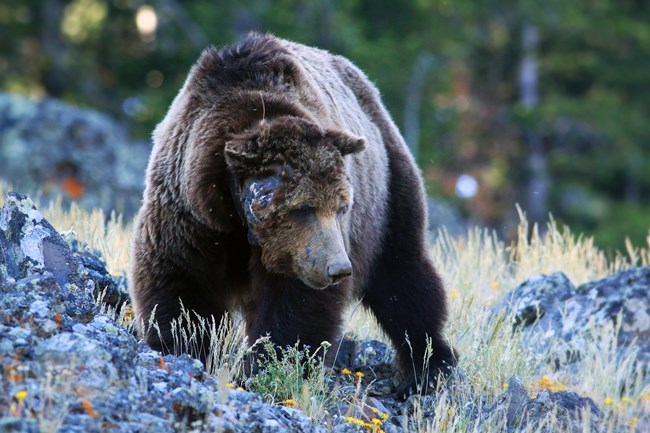
Charissa Reid From Yellowstone Science 23(2): 2015, page 47. Anthropomorphism is defined as transferring human characteristics and feelings onto other species.In the Greater Yellowstone Ecosystem (GYE), this manifests itself in many different ways. It may cause a specific wolf or bull elk to be identifiable and be assigned a personality that includes a human name,a Twitter hashtag, or even a "I Saw Bear 399" bumper sticker. As National Park Service (NPS) Chief Wildlife Biologist Glenn Plumb puts it, "People name wild animals as a way of forming a relationship with something that is largely beyond their personal understanding." In a world that is often very removed from nature and from the wild things in particular, any relationship that is forged may seem like a positive thing. A child who visits the GYE and sees grizzly bear "Molly" with her cub "Tickles" in a meadow near Fishing Bridge not only has a vocabulary that allows him to tell the story of that encounter, but also has food for the imagination. He may imagine the feelings of "Molly" as "Tickles" leaves her side or when winter covers the landscape. How will "Tickles" stay warm? So, what's wrong with that? As I spoke to wildlife biologists, several things led me to believe that this sort of personalization was, in the long run, a limiting and negative thing. First of all, anthropomorphism limits our knowledge about other species. Time and again, science has shown us that many creatures are capable of hearing, seeing, tasting, and smelling things that are beyond our human capabilities. With so little known about the interaction of instinct and cognition that drive the bear, the wolf, or the cutworm moth, assigning human characteristics and motivations to their actions may make it more difficult to learn about the astounding reality scientific research can reveal. Perhaps, most importantly, thinking of wild animals as individuals causes us to narrow our focus about what national parks are here to protect. P.J. White, Yellowstone's Chief Wildlife Biologist, stated the NPS should, "Discourage visitors from giving celebrity status to certain animals, which leads to their naming and anthropomorphism. Though some argue this helps connect people with nature, it also creates unrealistic expectations and issues for managers tasked with sustaining viable populations of wildlife rather than a zoo-like atmosphere where beloved animals are guaranteed protection." If we are tasked with preserving wild places for the future, we must think beyond our myopia of individual animals—named or unnamed, known or unknown—and think about preserving generations. Populations. Processes. Systems. It is a wonderful thing to feel a connection with wildness.It is an even more wonderful thing to realize that this wildness is the keeper of many mysteries. I, for one, will be working hard at not limiting what those mysteries may be. And I'll be keeping my eyes on what I can do to protect the big picture. |
Last updated: December 21, 2015
